Billy Graham Center
Archives
"Make This the Best Year of Our Lives": Scenes of Christian Ministry from the Year 1898.
[This talk was given by Robert Shuster of the BGC Archives on May 9, 1998 at 9:30am in Barrows
Auditorium in the Billy Graham Center. The talk was part of the annual Treasures of Wheaton program,
given on Alumni Day. The other speakers were Lawrence Thompson of the College's Archives and Special
Collections and Christopher Mitchell of the Wade Center.
Shuster's talk was illustrated by slides, most of which are imbedded in the text that follows. It also
included audio tapes of excerpts from documents. Except in the case of Everett Mitchell, the excerpts
were of contemporary people reading from 1898 documents. Audio excerpts are indicated in the text that
follows by italics.]
What I want to do this morning is to reach into the Archives for you and
give you a few snapshots from 1898, a hundred years ago today. Not a very long time,
really, in the flow of history, but enough perhaps to give us some perspective. Some of
the snapshots are actual photos, most of which are from the Archives' collections. Others are
word pictures, from 1898 documents. The people of the
century we are going to visit had not hear of digital scanners or deconstruction or World
War II or Bolsheviks or airplanes. But they could find self portraits in the Psalms or
Isaiah as readily as ourselves. They stood then on the soil we are standing on now, stood
on legs as frail as our own, while looking toward the hope they and we shared with
Christians past, present and future. I hope the excerpts I present will not only show how
they were different from us, but also how they were the same.
Lets start with endings. 1898 has some prominent deaths. One
was Prussian-turned-Englishman, evangelist
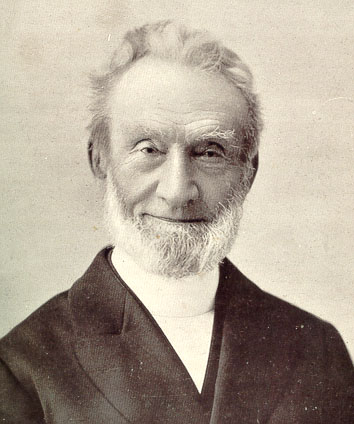 George Muller. For more than half a century he had, for Christ's
sake, taken care of the orphaned and abandoned children of Bristol, England. But he was
perhaps best known for his refusal to raise support for his work by any means except
prayer. His example was deeply influential in the American and English church. The
Archives only has two brief letters from Muller in our collections, but even in this hastily
scribbled note
George Muller. For more than half a century he had, for Christ's
sake, taken care of the orphaned and abandoned children of Bristol, England. But he was
perhaps best known for his refusal to raise support for his work by any means except
prayer. His example was deeply influential in the American and English church. The
Archives only has two brief letters from Muller in our collections, but even in this hastily
scribbled note 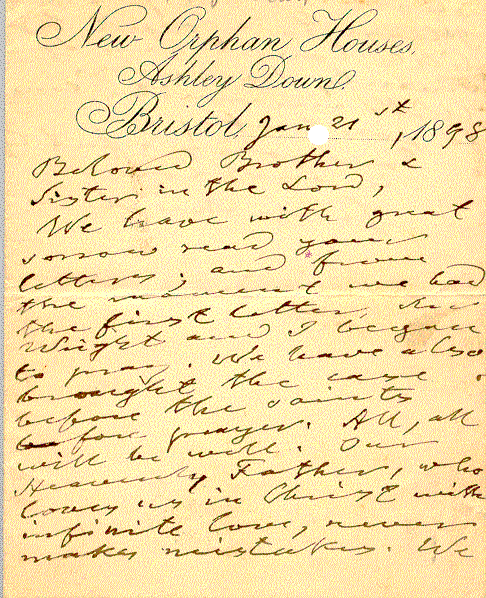 , written less than ten weeks before his death, he could not help
showing the kind of man he was:
, written less than ten weeks before his death, he could not help
showing the kind of man he was:
Beloved Brother and Sister in the Lord,
We have with great sorrow read your letters; and from the moment we had
the first letter, Wright and I began to pray. We also brought the case
before the saints for prayer. All, all will be well. Our Heavenly Father,
who loves us in Christ with infinite love, never makes mistakes. We shall
go on praying. Please accept the little love token of twenty pounds.
With our united love to you both
Ever yours affectly [sic] in our Lord,
George Müller 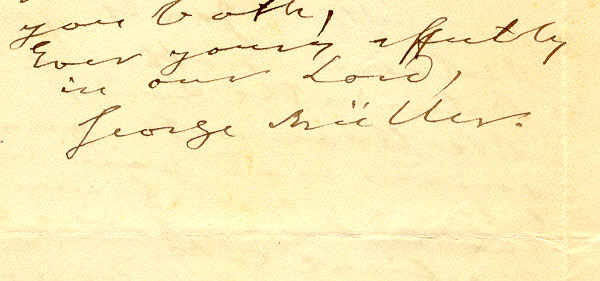
Müller's good friend, Dwight L. Moody himself would never make it into the twentieth
century, dying a few days before the close of 1899.
It was a year of beginnings as well, although of course we who are looking back know more
about them than most people living at the time. Walter Judd, missionary doctor to China
and anticommunist battler was born in 1898, as was Chou En Lai, who would be one of
the main leaders of the communist movement that would expel foreign missionaries like
Judd from China.
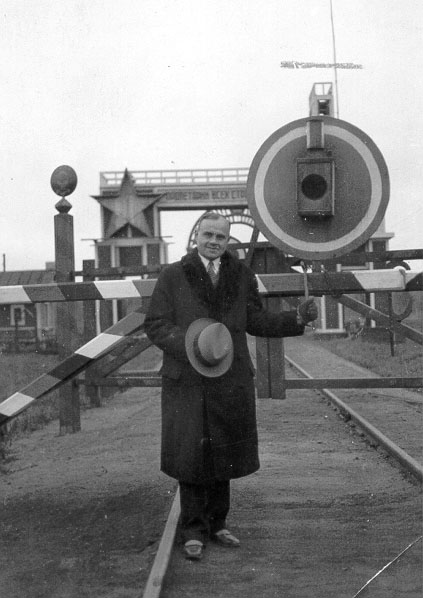 Peter Deyneka Sr. began life in the province of Grodno, a part of the Tsarist Russian
empire. When he grew up, he would emigrate to the United States, make a home for
himself in Chicago and start a work to bring the Gospel to Slavic people around the
world, including Russia.
Peter Deyneka Sr. began life in the province of Grodno, a part of the Tsarist Russian
empire. When he grew up, he would emigrate to the United States, make a home for
himself in Chicago and start a work to bring the Gospel to Slavic people around the
world, including Russia.
Another birth that year was Everett Mitchell, who was a soloist at Billy Sunday meetings
as a teenager. Here is his story about his start in life :
MITCHELL: At that time, it was not...not part of Chicago, because Chicago
stopped at what they all called 'old 48th Street', which is now Cicero
Avenue. The place where I was born was called Moreland and it was out in
a little agricultural community. My father was a vegetable farmer and I
was born on March 15, 1898. And a very peculiar thing happened. In fact
the country doctor came...and he said, "What was another boy in those
days?" They had boys, everybody had boys, and another boy didn't mean
much so he didn't drive to the county seat and register me. But finally, I
found him when I needed this birth certificate and he was ninety-six years
old.... Then he said to me, "Now what year were you supposed to be born?"
And I said, '1898.' So he reached up on the shelf and pulled the book
down, and then he kept turning to the Mitchell account and he said, now he
said, "You had a lot of trouble in your family that year." And he said, 'hat
was that date again?' And I said, 'March 15.' So he turned in to March
15, and there it was in the book: 'One Boy. Ten dollars.' And I looked at it
and I said, 'But doctor, it isn't...it isn't paid". And he said, 'Well there's a
story goes with that because I had lost my boy two months before you were
born. Your mother had seven girls and she...that was a lot of mouths to
feed and times were pretty hard.' And so he said, 'I went to her and said to
her, 'Now you may not be able to take care of this little fellow so I'll adopt
him.'' And he said, 'She looked me right straight in the eye and she said,
'Well, Doctor, God has given me the opportunity and the ability to feed the
others, and I'm sure that God will continue to give me the opportunity to
feed this one.'' So he said, 'I was a little ashamed of myself and I never
sent her a bill.'"
Ministries as well as people were getting their start in 1898, and some of these too looked
to God for the opportunity to be fed. 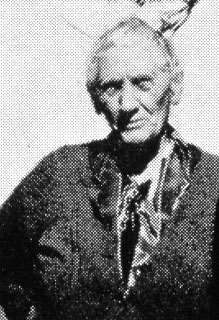 Petra Malena Moe, better known as Malla Moe, a worker with the Scandinavian
Alliance Mission, had just built a home called Bethel in Swaziland, in southern Africa.
Her letters and diaries in the Archives tell how from this spot for the next sixty-six years
Petra Malena Moe, better known as Malla Moe, a worker with the Scandinavian
Alliance Mission, had just built a home called Bethel in Swaziland, in southern Africa.
Her letters and diaries in the Archives tell how from this spot for the next sixty-six years
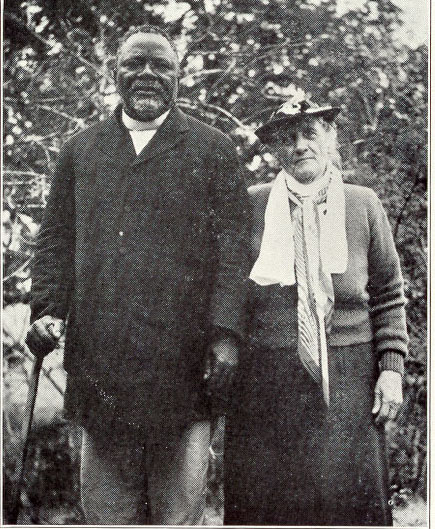 she would function as evangelist, church planter, pastor, teacher, mother and
unofficial bishop to a community of faith among the Zulu and other peoples.
she would function as evangelist, church planter, pastor, teacher, mother and
unofficial bishop to a community of faith among the Zulu and other peoples.
Another evangelist was just getting started in 1898.
Chicagoan Billy Sunday 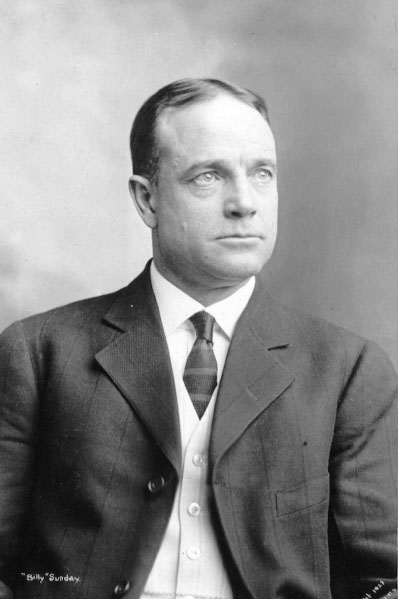 had
preached his first evangelistic campaign in 1896 in Garner, Iowa. His reputation grew
slowly and in 1898 he lead a handful of meetings in nearby cities. In November he was
speaking about 110 miles west of here in Savanna, Illinois, right on the Mississippi River.
Although he was still a novice, his style was so much an expression of the man that
already his method of preaching was recognized as distinctively his own. Listen to the
gradually mounting enthusiasm of the editor of the Savanna Daily Times:
had
preached his first evangelistic campaign in 1896 in Garner, Iowa. His reputation grew
slowly and in 1898 he lead a handful of meetings in nearby cities. In November he was
speaking about 110 miles west of here in Savanna, Illinois, right on the Mississippi River.
Although he was still a novice, his style was so much an expression of the man that
already his method of preaching was recognized as distinctively his own. Listen to the
gradually mounting enthusiasm of the editor of the Savanna Daily Times:
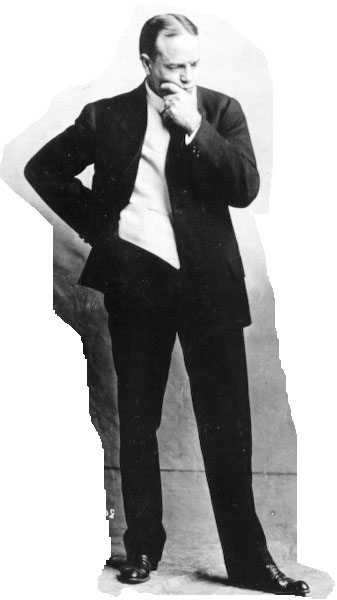 "Last night Mr. Sunday delivered a sermon on "Infidelity" as previously
announced. He had business and professional men, railroad boys, the
unbeliever and a mixed audience in general. Those who might have
"Last night Mr. Sunday delivered a sermon on "Infidelity" as previously
announced. He had business and professional men, railroad boys, the
unbeliever and a mixed audience in general. Those who might have
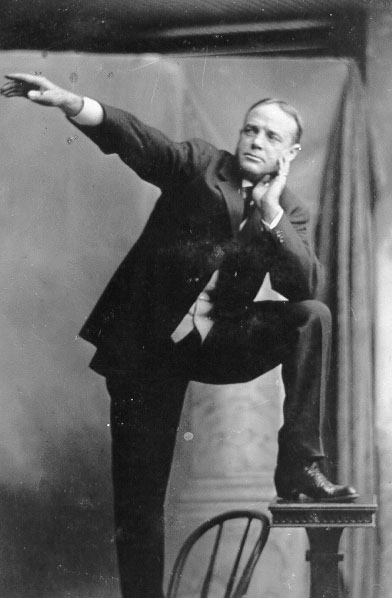 set Sunday down as an evangelist for reviers only, an inexperienced
platform speaker or a man who is not what the world needs in this work
went home disappointed. To use the expression heard many times today, he
set Sunday down as an evangelist for reviers only, an inexperienced
platform speaker or a man who is not what the world needs in this work
went home disappointed. To use the expression heard many times today, he
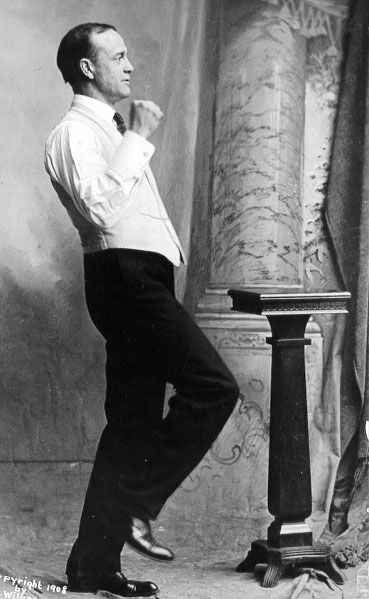 is a 'cracker-jack.' His fervency cannot be questioned. The earnest
spirit exhibited won the admiration of sinner and backslider. He is a
whirlwind in the pulpit, forceful in delivery, correct in his arguments. He
is a 'cracker-jack.' His fervency cannot be questioned. The earnest
spirit exhibited won the admiration of sinner and backslider. He is a
whirlwind in the pulpit, forceful in delivery, correct in his arguments. He
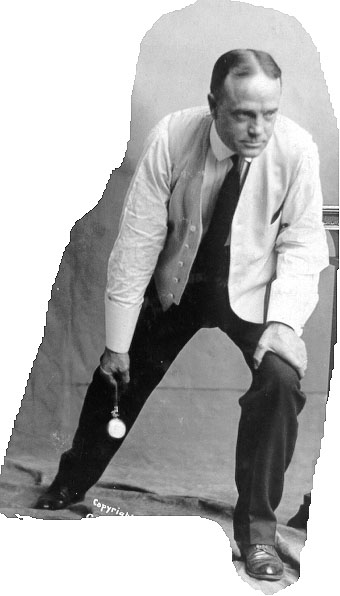 has brains and they are in perfect working order. He can say more in a
minute that some preachers can in an hour. He talks distinctly and with a
rapidity that the average mother-in-law would envy.... He does not mince
matters and in his work invariably calls a spade a spade.
has brains and they are in perfect working order. He can say more in a
minute that some preachers can in an hour. He talks distinctly and with a
rapidity that the average mother-in-law would envy.... He does not mince
matters and in his work invariably calls a spade a spade. 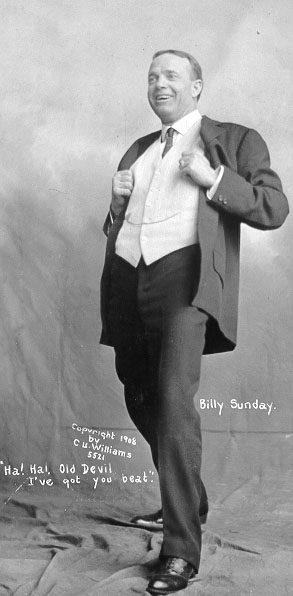 The church
members are as apt to receive a dig in the ribs as the most wretched sinner. Even if this kind of doctrine and ideas cause wincing, it is needed in
Savanna, all will admit."
The church
members are as apt to receive a dig in the ribs as the most wretched sinner. Even if this kind of doctrine and ideas cause wincing, it is needed in
Savanna, all will admit."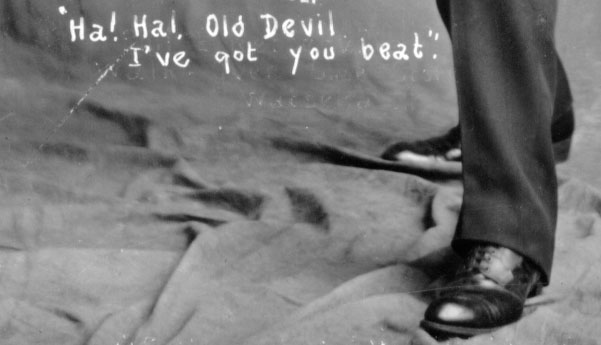
Sunday was a Chicagoan, as I said, and he sometimes spoke at one of the city's leading
institutions, the Chicago Avenue Church at the corner of Chicago and LaSalle streets.
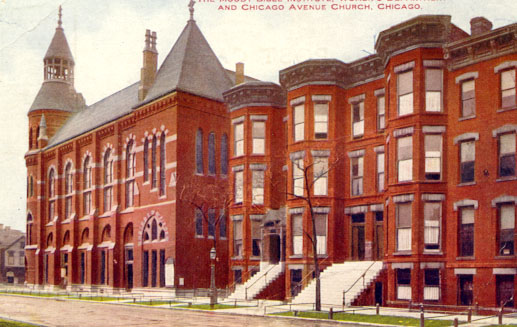 (The church is on the left) People were already calling this the Moody Church,
because it was for all intents and purposes started by Dwight L. Moody and would be
renamed for him after his death. If we were a group of Wheatonities gathered together in
1898 instead of 1998, we probably would all have had some connection or other
with the Chicago Avenue Church, starting with College president Charles Blanchard who
served as supply pastor there from 1891 to 1893. In this church Malla Moe received her
call to be a missionary in the 1880s and in this church Peter Deyneka Sr. would
committed his life to Christ in the 1920s. In the Archives are dozens of boxes of records
of this community of faith, including material from around 1898 - materials that show
disputes or disagreements, such as minutes on the excommunication of members. We have minutes and letters that deal with janitors salaries and replaced pavements
and new hymns for the choir and broken water pipes. They also show a church with
activities of every type for every age group so that the church was almost a world unto
itself for its members.
(The church is on the left) People were already calling this the Moody Church,
because it was for all intents and purposes started by Dwight L. Moody and would be
renamed for him after his death. If we were a group of Wheatonities gathered together in
1898 instead of 1998, we probably would all have had some connection or other
with the Chicago Avenue Church, starting with College president Charles Blanchard who
served as supply pastor there from 1891 to 1893. In this church Malla Moe received her
call to be a missionary in the 1880s and in this church Peter Deyneka Sr. would
committed his life to Christ in the 1920s. In the Archives are dozens of boxes of records
of this community of faith, including material from around 1898 - materials that show
disputes or disagreements, such as minutes on the excommunication of members. We have minutes and letters that deal with janitors salaries and replaced pavements
and new hymns for the choir and broken water pipes. They also show a church with
activities of every type for every age group so that the church was almost a world unto
itself for its members.
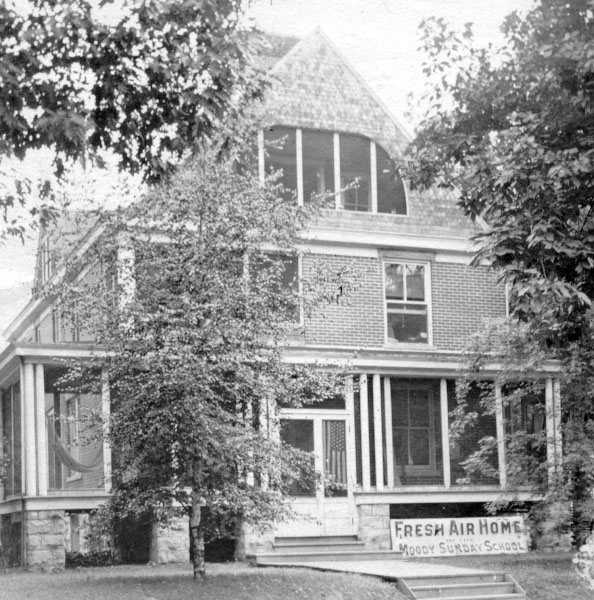 But it was also a church with members that was trying to find ways
to make its life in the
world the same as Christ's. The fresh air work started in approximately 1898, the
purpose of which was to take kids like these
But it was also a church with members that was trying to find ways
to make its life in the
world the same as Christ's. The fresh air work started in approximately 1898, the
purpose of which was to take kids like these 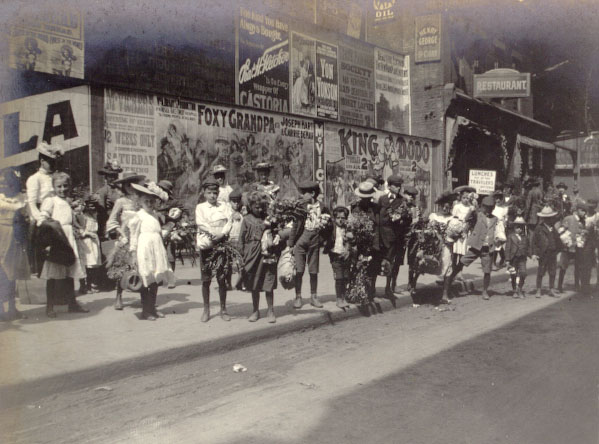 who had never been out of the stink of
the city and give them a few weeks of camp in the then rural suburbs of Ravina and
Glencoe, where they could have fun, hikes,
who had never been out of the stink of
the city and give them a few weeks of camp in the then rural suburbs of Ravina and
Glencoe, where they could have fun, hikes, 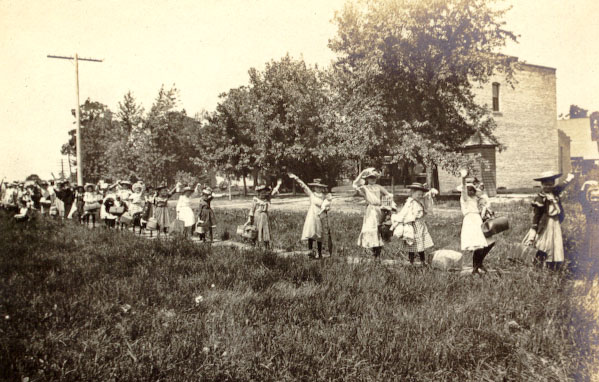 exercise, fellowship, taffy pulls,
hayrides,
exercise, fellowship, taffy pulls,
hayrides,
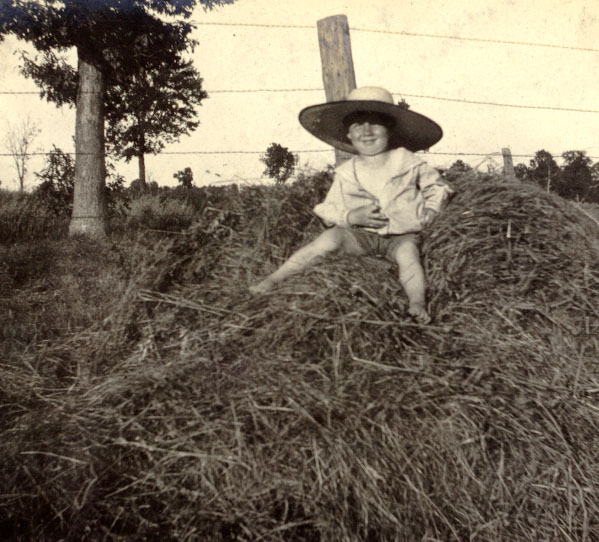 and a chance to learn about Jesus.
and a chance to learn about Jesus.
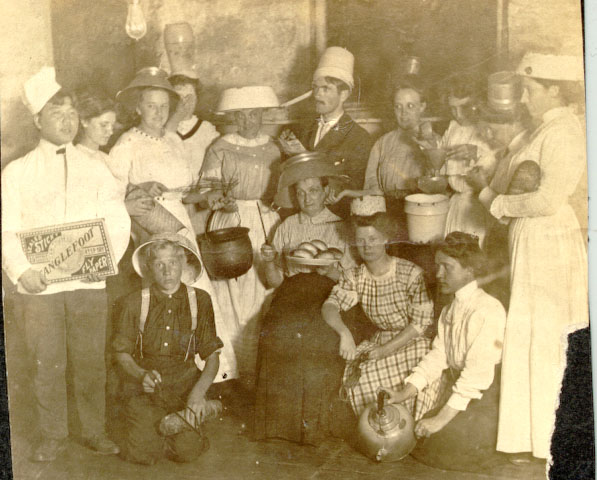 (I included this picture
as a reminder that history is always is in part a mystery. Your guess is as good as mine as as to what the
staff of the Fresh Air House is doing here and why.)
(I included this picture
as a reminder that history is always is in part a mystery. Your guess is as good as mine as as to what the
staff of the Fresh Air House is doing here and why.)
 Mel Trotter also came to the church occasionally. In future years he would found
dozens of rescue missions, under the slogan "Everlasting At It!" This would also have
been a good motto the Chicago Avenue Church. Listen, for example, to the annual report
of the Christian Endeavor Society, a young people's group:
Mel Trotter also came to the church occasionally. In future years he would found
dozens of rescue missions, under the slogan "Everlasting At It!" This would also have
been a good motto the Chicago Avenue Church. Listen, for example, to the annual report
of the Christian Endeavor Society, a young people's group:
"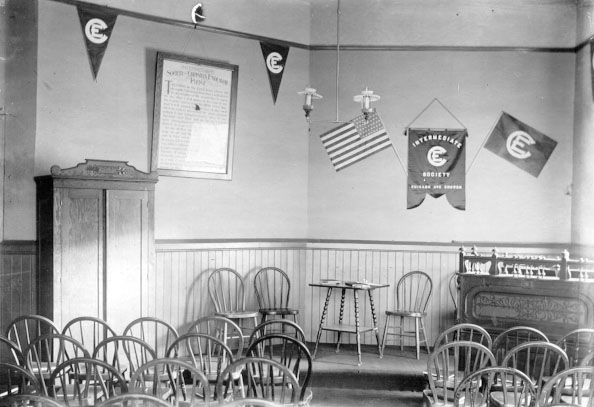 Meetings have been held each Monday Evening at 7:45, with a
good attendance. We have on our roll call at present one hundred
and eleven members, after dropping a number for nonattendance, and a goodly number of our most valued members because they
found it impossible to attend four or five services on Sunday, also
Monday and Tuesday Evenings in succession. We miss their presence
and helpful testimony, and yet we respect their judgment., and bid
them God speed....
Meetings have been held each Monday Evening at 7:45, with a
good attendance. We have on our roll call at present one hundred
and eleven members, after dropping a number for nonattendance, and a goodly number of our most valued members because they
found it impossible to attend four or five services on Sunday, also
Monday and Tuesday Evenings in succession. We miss their presence
and helpful testimony, and yet we respect their judgment., and bid
them God speed....
Every six weeks a Missionary Meeting is held, at which a collection is
taken to support two native teachers in Africa. In August last we sent
$41 to the India Relief Fund.
During the Summer months open air meetings were held., from April
to October,, regularly every Sunday morning, which resulted in the
conversion of not a few, and the strengthening and encouraging of
those engaged in the work.
Our Good Literature Committee have visited hospitals and the
Poor House quite frequently during the past year, distributing
religious periodicals and tracts and a few Bibles, carrying flowers to
the sick, and also having charge of a circulating library....
Our Sunday School committee have visited a great
number of children and also gathered many from the streets into the
Sunday School....
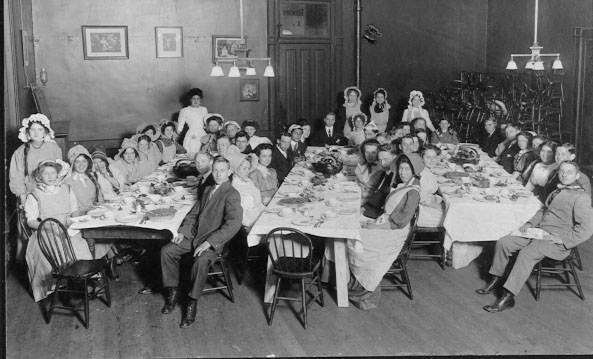 On November 14th we received a very interesting letter from our
Pastor, and one of the many helpful suggestions in it was the need of a
training class for Christian Workers in connection with our society.
The practicability of such a class was at once apparent.
Consequently we have organized one, under the very efficient
leadership of Mr. Jacoby. It Meet every Monday Evening at 7:45pm
in the Yokefellows Room
On November 14th we received a very interesting letter from our
Pastor, and one of the many helpful suggestions in it was the need of a
training class for Christian Workers in connection with our society.
The practicability of such a class was at once apparent.
Consequently we have organized one, under the very efficient
leadership of Mr. Jacoby. It Meet every Monday Evening at 7:45pm
in the Yokefellows Room
, the entrance to which is by the Chicago Avenue Door. All who
feel their need of being taught how to lead others to Christ will meet a
very hearty welcome there.
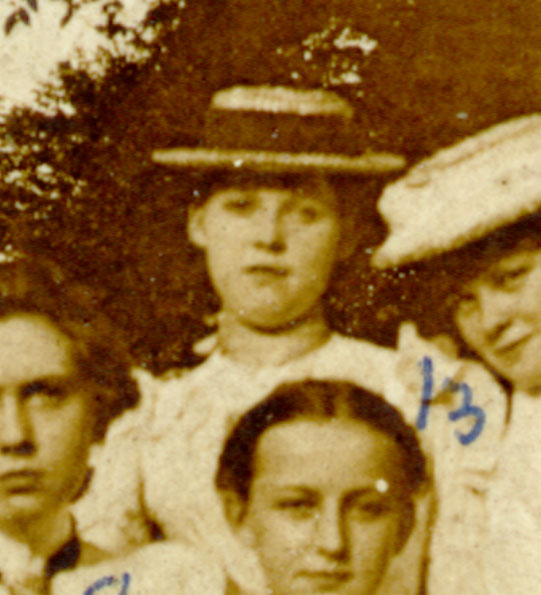 Respectfully submitted
Respectfully submitted
Louise C. Atchison.,
President."
Eighteen ninety-eight was a year that historians call a turning a point. At least it is the
point when something that had been developing for a long time became obvious to all. In
1898, the United States went to war with Spain and for better or worse acquired colonies
and acknowledgment as a world power. 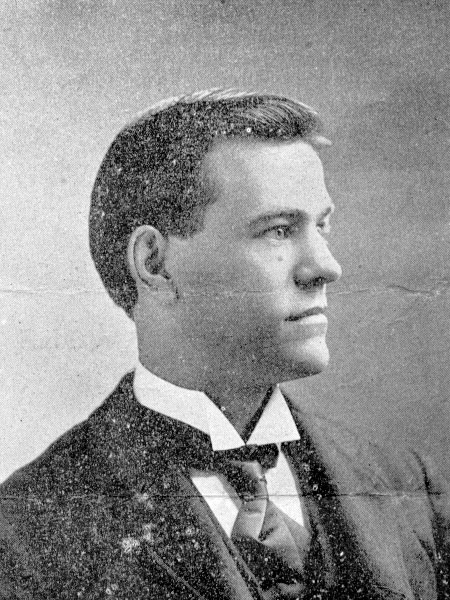 In Indiana, young William Biederwolf resigned from his pulpit to become a
chaplain of the 161th Indiana Regiment. In his farewell speech to his congregation,
he gave a typical talk of the time that mixed Christian reflections with spread eagle
patriotism, joy of the Lord with jingoism.
In Indiana, young William Biederwolf resigned from his pulpit to become a
chaplain of the 161th Indiana Regiment. In his farewell speech to his congregation,
he gave a typical talk of the time that mixed Christian reflections with spread eagle
patriotism, joy of the Lord with jingoism.
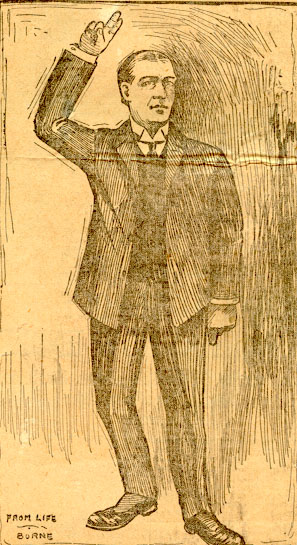 "You know I am opposed to war. I think it a barbarous and
unChristian way of attempting to settle disputes. I deprecate very much the
feeling of hatred toward Spain. I believe before God that America has been
chosen to administer to that half civilized and brutal nation a fearful but
well deserved punishment but you may talk of patriotism as you will. When
the heart is filled with tiger feelings of hatred and anger, the heart is not in
the sight of God. We must fight this battle out on a higher principle than
revenge. The cry "Remember the Maine" is the war cry of savagery and it
does not breath the spirit of a forgiving Son of God..... But while every
inch of our soul revolts at the thought of war, as the world is organized
today times come when the Christian patriot must fight. When every
means for peace has been exhausted to cry "peace at any cost" is sickly
sentimentalism when war can no longer be averted it is the duty of the
Christian patriots to fight. In offering my service I did not know one thing
concerning the chaplaincy, only that I should be concerned for the spiritual
welfare of 1000 men at a time when their hearts are especially susceptible
to the Spirit of God..... Further than this I know nothing but if it pleases
God to bring the 161th into fighting quarters with the enemy and if in
fighting my body shall fall upon the field of battle whether kneeling beside
the wounded or marching by their side when they fall, even though others
may do for me what I go to do for them, I shall always pray God to give me
grace to do my duty well."
"You know I am opposed to war. I think it a barbarous and
unChristian way of attempting to settle disputes. I deprecate very much the
feeling of hatred toward Spain. I believe before God that America has been
chosen to administer to that half civilized and brutal nation a fearful but
well deserved punishment but you may talk of patriotism as you will. When
the heart is filled with tiger feelings of hatred and anger, the heart is not in
the sight of God. We must fight this battle out on a higher principle than
revenge. The cry "Remember the Maine" is the war cry of savagery and it
does not breath the spirit of a forgiving Son of God..... But while every
inch of our soul revolts at the thought of war, as the world is organized
today times come when the Christian patriot must fight. When every
means for peace has been exhausted to cry "peace at any cost" is sickly
sentimentalism when war can no longer be averted it is the duty of the
Christian patriots to fight. In offering my service I did not know one thing
concerning the chaplaincy, only that I should be concerned for the spiritual
welfare of 1000 men at a time when their hearts are especially susceptible
to the Spirit of God..... Further than this I know nothing but if it pleases
God to bring the 161th into fighting quarters with the enemy and if in
fighting my body shall fall upon the field of battle whether kneeling beside
the wounded or marching by their side when they fall, even though others
may do for me what I go to do for them, I shall always pray God to give me
grace to do my duty well."
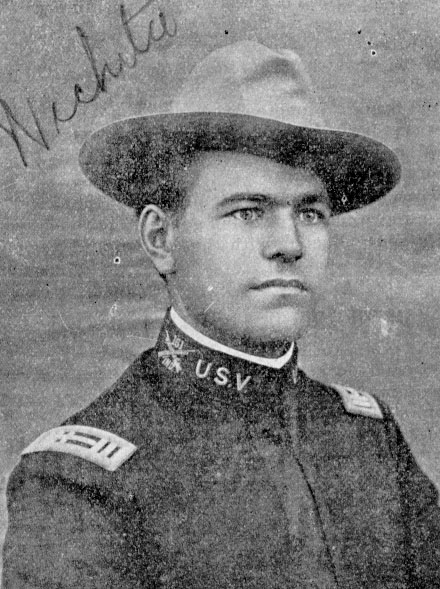 His actual war experience, as that of so many others was to be somewhat anti-climatic. He spent most of it in Florida, where the regiment trained for a combat
assignment that never came. As he said later in 1898 in a farewell speech to his regiment,
His actual war experience, as that of so many others was to be somewhat anti-climatic. He spent most of it in Florida, where the regiment trained for a combat
assignment that never came. As he said later in 1898 in a farewell speech to his regiment,
"We were all disappointed in Florida and were convinced that one of the
conditions of the peace conditions should be that Spain, from whom we got
it, should take it back..... We expected a land of lovely foliage and luscious
fruitage; we expected monkeys to throw coconuts at us from the tops of
those beautiful palms. But there was enough of some things.... There was
enough sand for a Sahara; enough sun that came down so straight about
twelve that it made a fellow hunt for his own shadow."
Other Americans were going overseas. Thousands ran, ill-prepared and ill-informed, to
Alaska and the Yukon to participate in the last great gold rush on the North American
continent. And Christians, in various stages of preparation, went overseas, to share
what they personally treasured, their faith. In the Archives are letters and reports from
India, Japan, China and other countries that tell of missionaries' commitment and failings,
compassion and misunderstandings both. They record, in many different settings the
birth, seen through foreign eyes, of branches of a common fellowship, however marred
the observer and the observed were by cultural biases and other flaws of fallen humanity.
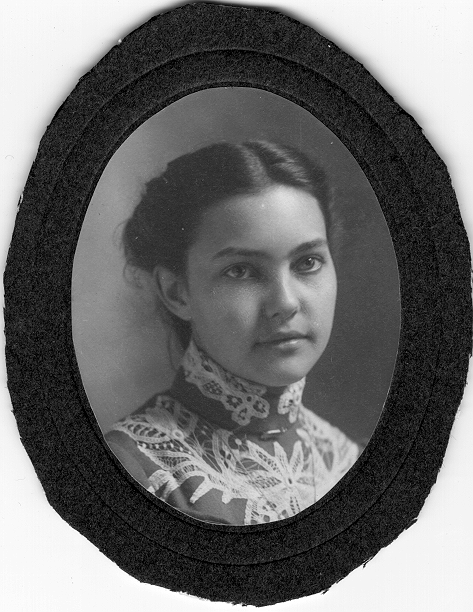 Sarah Alice
Troyer was born in the Midwest and went out to China in 1896 as a
missionary. In her letters we hear an authentic and unique Christian voice, by turns
homesick, eager, discouraged, intrigued and put off by a different culture, committed to
service and with a joy in the Lord.
Sarah Alice
Troyer was born in the Midwest and went out to China in 1896 as a
missionary. In her letters we hear an authentic and unique Christian voice, by turns
homesick, eager, discouraged, intrigued and put off by a different culture, committed to
service and with a joy in the Lord.
The year had barely begun when she wrote to her sisters about the Christmas holiday of
herself and her coworker Carrie Gates:
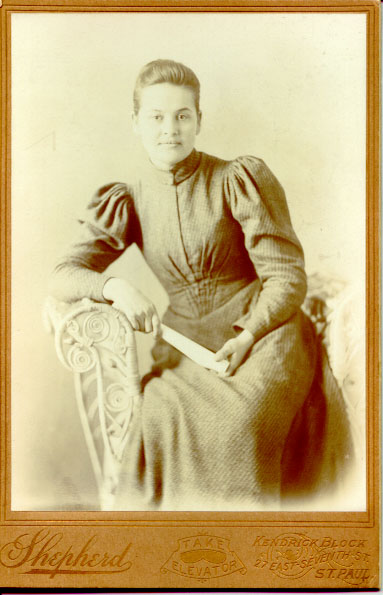 "The last
day of the year was mission's day for fasting and prayer. We
stayed in our rooms for quiet until 11 o'clock when we met in the sitting
room for reading and prayer together. Mr Barrows gave us a nice word on
the 'continual sacrifice' and the fire of God coming down to consume it and
the application - offering ourselves up for a continual sacrifice to Him and
having the fire of the Holy Ghost come upon us to consume the dross and
give us power for service. After this some of us took a light dinner of bread
and butter then returned to our own quiet rooms again. New Year's dinner
was Quite as good as at home- Roast goose, fowl, dressing, tomatoes,
potatoes, carrots, stewed onions, tomato and cucumber pickles, catsup,
pumpkin pie, plum pudding, walnuts, coffee, or tea. Also among other
things were cookies, chocolate and nut cake and peach sauce. How is that
for China?"
"The last
day of the year was mission's day for fasting and prayer. We
stayed in our rooms for quiet until 11 o'clock when we met in the sitting
room for reading and prayer together. Mr Barrows gave us a nice word on
the 'continual sacrifice' and the fire of God coming down to consume it and
the application - offering ourselves up for a continual sacrifice to Him and
having the fire of the Holy Ghost come upon us to consume the dross and
give us power for service. After this some of us took a light dinner of bread
and butter then returned to our own quiet rooms again. New Year's dinner
was Quite as good as at home- Roast goose, fowl, dressing, tomatoes,
potatoes, carrots, stewed onions, tomato and cucumber pickles, catsup,
pumpkin pie, plum pudding, walnuts, coffee, or tea. Also among other
things were cookies, chocolate and nut cake and peach sauce. How is that
for China?"
A few days later she wrote:
Monday morning Jan. 9 '98 The first week of '98 ended. We have
unitedly asked the Lord to make this the best year of our lives and that He
will show forth His signs and wonders to confirm the word according to
Mark. Carrie and I made another effort to start a women's class.
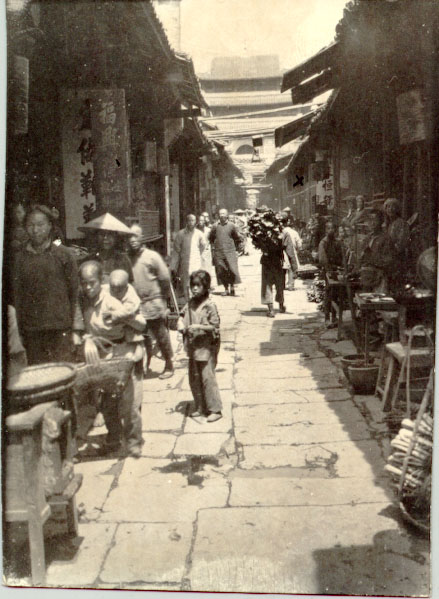 Yesterday I went out to invite them in and Carrie received them and
preached to them.... Carrie said "if you get one or two it will be good but I
don't think they'll come at this time of day". I came back without a single
woman. Took up my Bible and read John.21--the account of the fishing
party. All night they had caught nothing but when Jesus came on the scene
and told them where to cast the net it got very full. "Alright," I thought,
"tho' I have caught not a single fish He will undertake for me and my net
shall yet be full." At present it is not the best time as the women are
all so busy preparing for the new year. The night before N.Y. day, the
creditors are out with their lanterns looking for the people who owe them.
As long as they need a candle to light them along the dark street, the
pursuit may continue. But as soon as New Year's day dawns, they must
return to their homes.... At this season there is great scrambling for money
and very often the people suddenly become very friendly to us, sending us
presents, etc. and afterwards come to borrow money. We have learned to
know pretty well, and Miss. Gates seldom accepts presents. Others make
great professions of faith in the Gospel but when they find they will not get
employment or pay to come to our meetings we hear or see nothing more of
them at our home. We need to be more careful in taking in people."
Yesterday I went out to invite them in and Carrie received them and
preached to them.... Carrie said "if you get one or two it will be good but I
don't think they'll come at this time of day". I came back without a single
woman. Took up my Bible and read John.21--the account of the fishing
party. All night they had caught nothing but when Jesus came on the scene
and told them where to cast the net it got very full. "Alright," I thought,
"tho' I have caught not a single fish He will undertake for me and my net
shall yet be full." At present it is not the best time as the women are
all so busy preparing for the new year. The night before N.Y. day, the
creditors are out with their lanterns looking for the people who owe them.
As long as they need a candle to light them along the dark street, the
pursuit may continue. But as soon as New Year's day dawns, they must
return to their homes.... At this season there is great scrambling for money
and very often the people suddenly become very friendly to us, sending us
presents, etc. and afterwards come to borrow money. We have learned to
know pretty well, and Miss. Gates seldom accepts presents. Others make
great professions of faith in the Gospel but when they find they will not get
employment or pay to come to our meetings we hear or see nothing more of
them at our home. We need to be more careful in taking in people."
At the end of the year, in December Sarah sent another letter home that talked about an
evangelistic trip she and Carrie took.
"You see from the heading of this letter that I am not at home.
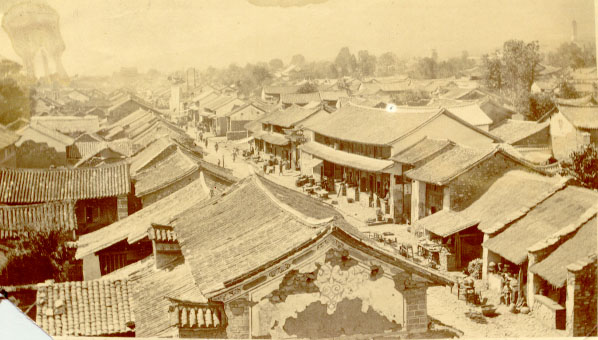 Carrie
and I are staying in an inn in this city. We came a week ago and expect to
stay another one.... This city is one of the second class but it is not a nice
one. The people seem to be far less industrious than our own people at
Luanfu and there are even more opium smokers than there. Sometimes out
of a company of five or six four or five are opium takers. We can tell them
at once by their deathly faces and black teeth. This city is only about 50 li
from Luanfu but there is a great difference in the people and even the
language differ very much. So that the first days we had some difficulty in
understanding the people and they much more in understanding us
especially when we spoke of the Gospel which they had not heard before.
Until today we had crowds from morning till night so that when night came
we had sore heads and sore throats...."
Carrie
and I are staying in an inn in this city. We came a week ago and expect to
stay another one.... This city is one of the second class but it is not a nice
one. The people seem to be far less industrious than our own people at
Luanfu and there are even more opium smokers than there. Sometimes out
of a company of five or six four or five are opium takers. We can tell them
at once by their deathly faces and black teeth. This city is only about 50 li
from Luanfu but there is a great difference in the people and even the
language differ very much. So that the first days we had some difficulty in
understanding the people and they much more in understanding us
especially when we spoke of the Gospel which they had not heard before.
Until today we had crowds from morning till night so that when night came
we had sore heads and sore throats...."
She went on to write of her upcoming marriage to fellow missionary John Young and
their plans to travel to the coast for the wedding,
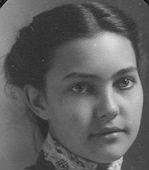 "I shall go down some time before him so as to do all our buying etc.
that we may leave directly after our marriage. If it is not to late we shall
spend some time at Chefu or pei tai he before coming on inland. If late,
our honeymoon will be spent in a little boat on the river and in mule litters
on our way to our station which we must reach before the rainy season
comes on."
"I shall go down some time before him so as to do all our buying etc.
that we may leave directly after our marriage. If it is not to late we shall
spend some time at Chefu or pei tai he before coming on inland. If late,
our honeymoon will be spent in a little boat on the river and in mule litters
on our way to our station which we must reach before the rainy season
comes on."
Within four months of this letter, Sarah and John were married. Within 19 months of this
letter, she and John experienced in the most direct possible way the alter of sacrifice that
Mr. Barrows had preached about. They were executed during the Boxer uprising in
China, along with thousands of Chinese Christians.
They say that the past is another country. In visiting even the very recent past, such as
the year 1898, we can see how that is both true and untrue. As the people of 1898 speak
and act, we can hear ways that their expressions are not our expressions, their thoughts
are not our thoughts and perhaps at times we can be chilled by knowing what their future
holds. We are indeed divided from them by time. But we are also united to them by
eternity. When our ears become a little more sensitive, we can hear that the basic
motivators of the heart, the faith and fears, hope and vanities, though expressed in
different words, are not different from our own, however the expressions may change or
the environment in which they function. A cloud of witness indeed, rebuking and
encouraging us and a reminder how the Creator has mixed together the eternal and the
temporary in the humble daily minute we use each day.
Return to BGC Archives Home Page
Last Revised: 5/11/98
Expiration: indefinite
© Wheaton College 2005
 George Muller. For more than half a century he had, for Christ's
sake, taken care of the orphaned and abandoned children of Bristol, England. But he was
perhaps best known for his refusal to raise support for his work by any means except
prayer. His example was deeply influential in the American and English church. The
Archives only has two brief letters from Muller in our collections, but even in this hastily
scribbled note
George Muller. For more than half a century he had, for Christ's
sake, taken care of the orphaned and abandoned children of Bristol, England. But he was
perhaps best known for his refusal to raise support for his work by any means except
prayer. His example was deeply influential in the American and English church. The
Archives only has two brief letters from Muller in our collections, but even in this hastily
scribbled note  , written less than ten weeks before his death, he could not help
showing the kind of man he was:
, written less than ten weeks before his death, he could not help
showing the kind of man he was:
 Peter Deyneka Sr. began life in the province of Grodno, a part of the Tsarist Russian
empire. When he grew up, he would emigrate to the United States, make a home for
himself in Chicago and start a work to bring the Gospel to Slavic people around the
world, including Russia.
Peter Deyneka Sr. began life in the province of Grodno, a part of the Tsarist Russian
empire. When he grew up, he would emigrate to the United States, make a home for
himself in Chicago and start a work to bring the Gospel to Slavic people around the
world, including Russia.  Petra Malena Moe, better known as Malla Moe, a worker with the Scandinavian
Alliance Mission, had just built a home called Bethel in Swaziland, in southern Africa.
Her letters and diaries in the Archives tell how from this spot for the next sixty-six years
Petra Malena Moe, better known as Malla Moe, a worker with the Scandinavian
Alliance Mission, had just built a home called Bethel in Swaziland, in southern Africa.
Her letters and diaries in the Archives tell how from this spot for the next sixty-six years
 she would function as evangelist, church planter, pastor, teacher, mother and
unofficial bishop to a community of faith among the Zulu and other peoples.
she would function as evangelist, church planter, pastor, teacher, mother and
unofficial bishop to a community of faith among the Zulu and other peoples.  had
preached his first evangelistic campaign in 1896 in Garner, Iowa. His reputation grew
slowly and in 1898 he lead a handful of meetings in nearby cities. In November he was
speaking about 110 miles west of here in Savanna, Illinois, right on the Mississippi River.
Although he was still a novice, his style was so much an expression of the man that
already his method of preaching was recognized as distinctively his own. Listen to the
gradually mounting enthusiasm of the editor of the Savanna Daily Times:
had
preached his first evangelistic campaign in 1896 in Garner, Iowa. His reputation grew
slowly and in 1898 he lead a handful of meetings in nearby cities. In November he was
speaking about 110 miles west of here in Savanna, Illinois, right on the Mississippi River.
Although he was still a novice, his style was so much an expression of the man that
already his method of preaching was recognized as distinctively his own. Listen to the
gradually mounting enthusiasm of the editor of the Savanna Daily Times:  "Last night Mr. Sunday delivered a sermon on "Infidelity" as previously
announced. He had business and professional men, railroad boys, the
unbeliever and a mixed audience in general. Those who might have
"Last night Mr. Sunday delivered a sermon on "Infidelity" as previously
announced. He had business and professional men, railroad boys, the
unbeliever and a mixed audience in general. Those who might have
 set Sunday down as an evangelist for reviers only, an inexperienced
platform speaker or a man who is not what the world needs in this work
went home disappointed. To use the expression heard many times today, he
set Sunday down as an evangelist for reviers only, an inexperienced
platform speaker or a man who is not what the world needs in this work
went home disappointed. To use the expression heard many times today, he
 is a 'cracker-jack.' His fervency cannot be questioned. The earnest
spirit exhibited won the admiration of sinner and backslider. He is a
whirlwind in the pulpit, forceful in delivery, correct in his arguments. He
is a 'cracker-jack.' His fervency cannot be questioned. The earnest
spirit exhibited won the admiration of sinner and backslider. He is a
whirlwind in the pulpit, forceful in delivery, correct in his arguments. He
 has brains and they are in perfect working order. He can say more in a
minute that some preachers can in an hour. He talks distinctly and with a
rapidity that the average mother-in-law would envy.... He does not mince
matters and in his work invariably calls a spade a spade.
has brains and they are in perfect working order. He can say more in a
minute that some preachers can in an hour. He talks distinctly and with a
rapidity that the average mother-in-law would envy.... He does not mince
matters and in his work invariably calls a spade a spade.  The church
members are as apt to receive a dig in the ribs as the most wretched sinner. Even if this kind of doctrine and ideas cause wincing, it is needed in
Savanna, all will admit."
The church
members are as apt to receive a dig in the ribs as the most wretched sinner. Even if this kind of doctrine and ideas cause wincing, it is needed in
Savanna, all will admit."
 (The church is on the left) People were already calling this the Moody Church,
because it was for all intents and purposes started by Dwight L. Moody and would be
renamed for him after his death. If we were a group of Wheatonities gathered together in
1898 instead of 1998, we probably would all have had some connection or other
with the Chicago Avenue Church, starting with College president Charles Blanchard who
served as supply pastor there from 1891 to 1893. In this church Malla Moe received her
call to be a missionary in the 1880s and in this church Peter Deyneka Sr. would
committed his life to Christ in the 1920s. In the Archives are dozens of boxes of records
of this community of faith, including material from around 1898 - materials that show
disputes or disagreements, such as minutes on the excommunication of members. We have minutes and letters that deal with janitors salaries and replaced pavements
and new hymns for the choir and broken water pipes. They also show a church with
activities of every type for every age group so that the church was almost a world unto
itself for its members.
(The church is on the left) People were already calling this the Moody Church,
because it was for all intents and purposes started by Dwight L. Moody and would be
renamed for him after his death. If we were a group of Wheatonities gathered together in
1898 instead of 1998, we probably would all have had some connection or other
with the Chicago Avenue Church, starting with College president Charles Blanchard who
served as supply pastor there from 1891 to 1893. In this church Malla Moe received her
call to be a missionary in the 1880s and in this church Peter Deyneka Sr. would
committed his life to Christ in the 1920s. In the Archives are dozens of boxes of records
of this community of faith, including material from around 1898 - materials that show
disputes or disagreements, such as minutes on the excommunication of members. We have minutes and letters that deal with janitors salaries and replaced pavements
and new hymns for the choir and broken water pipes. They also show a church with
activities of every type for every age group so that the church was almost a world unto
itself for its members. But it was also a church with members that was trying to find ways
to make its life in the
world the same as Christ's. The fresh air work started in approximately 1898, the
purpose of which was to take kids like these
But it was also a church with members that was trying to find ways
to make its life in the
world the same as Christ's. The fresh air work started in approximately 1898, the
purpose of which was to take kids like these  who had never been out of the stink of
the city and give them a few weeks of camp in the then rural suburbs of Ravina and
Glencoe, where they could have fun, hikes,
who had never been out of the stink of
the city and give them a few weeks of camp in the then rural suburbs of Ravina and
Glencoe, where they could have fun, hikes,  exercise, fellowship, taffy pulls,
hayrides,
exercise, fellowship, taffy pulls,
hayrides,  and a chance to learn about Jesus.
and a chance to learn about Jesus.  (I included this picture
as a reminder that history is always is in part a mystery. Your guess is as good as mine as as to what the
staff of the Fresh Air House is doing here and why.)
(I included this picture
as a reminder that history is always is in part a mystery. Your guess is as good as mine as as to what the
staff of the Fresh Air House is doing here and why.) Mel Trotter also came to the church occasionally. In future years he would found
dozens of rescue missions, under the slogan "Everlasting At It!" This would also have
been a good motto the Chicago Avenue Church. Listen, for example, to the annual report
of the Christian Endeavor Society, a young people's group:
Mel Trotter also came to the church occasionally. In future years he would found
dozens of rescue missions, under the slogan "Everlasting At It!" This would also have
been a good motto the Chicago Avenue Church. Listen, for example, to the annual report
of the Christian Endeavor Society, a young people's group: Meetings have been held each Monday Evening at 7:45, with a
good attendance. We have on our roll call at present one hundred
and eleven members, after dropping a number for nonattendance, and a goodly number of our most valued members because they
found it impossible to attend four or five services on Sunday, also
Monday and Tuesday Evenings in succession. We miss their presence
and helpful testimony, and yet we respect their judgment., and bid
them God speed....
Meetings have been held each Monday Evening at 7:45, with a
good attendance. We have on our roll call at present one hundred
and eleven members, after dropping a number for nonattendance, and a goodly number of our most valued members because they
found it impossible to attend four or five services on Sunday, also
Monday and Tuesday Evenings in succession. We miss their presence
and helpful testimony, and yet we respect their judgment., and bid
them God speed.... On November 14th we received a very interesting letter from our
Pastor, and one of the many helpful suggestions in it was the need of a
training class for Christian Workers in connection with our society.
The practicability of such a class was at once apparent.
Consequently we have organized one, under the very efficient
leadership of Mr. Jacoby. It Meet every Monday Evening at 7:45pm
in the Yokefellows Room
On November 14th we received a very interesting letter from our
Pastor, and one of the many helpful suggestions in it was the need of a
training class for Christian Workers in connection with our society.
The practicability of such a class was at once apparent.
Consequently we have organized one, under the very efficient
leadership of Mr. Jacoby. It Meet every Monday Evening at 7:45pm
in the Yokefellows Room Respectfully submitted
Respectfully submitted In Indiana, young William Biederwolf resigned from his pulpit to become a
chaplain of the 161th Indiana Regiment. In his farewell speech to his congregation,
he gave a typical talk of the time that mixed Christian reflections with spread eagle
patriotism, joy of the Lord with jingoism.
In Indiana, young William Biederwolf resigned from his pulpit to become a
chaplain of the 161th Indiana Regiment. In his farewell speech to his congregation,
he gave a typical talk of the time that mixed Christian reflections with spread eagle
patriotism, joy of the Lord with jingoism.  "You know I am opposed to war. I think it a barbarous and
unChristian way of attempting to settle disputes. I deprecate very much the
feeling of hatred toward Spain. I believe before God that America has been
chosen to administer to that half civilized and brutal nation a fearful but
well deserved punishment but you may talk of patriotism as you will. When
the heart is filled with tiger feelings of hatred and anger, the heart is not in
the sight of God. We must fight this battle out on a higher principle than
revenge. The cry "Remember the Maine" is the war cry of savagery and it
does not breath the spirit of a forgiving Son of God..... But while every
inch of our soul revolts at the thought of war, as the world is organized
today times come when the Christian patriot must fight. When every
means for peace has been exhausted to cry "peace at any cost" is sickly
sentimentalism when war can no longer be averted it is the duty of the
Christian patriots to fight. In offering my service I did not know one thing
concerning the chaplaincy, only that I should be concerned for the spiritual
welfare of 1000 men at a time when their hearts are especially susceptible
to the Spirit of God..... Further than this I know nothing but if it pleases
God to bring the 161th into fighting quarters with the enemy and if in
fighting my body shall fall upon the field of battle whether kneeling beside
the wounded or marching by their side when they fall, even though others
may do for me what I go to do for them, I shall always pray God to give me
grace to do my duty well."
"You know I am opposed to war. I think it a barbarous and
unChristian way of attempting to settle disputes. I deprecate very much the
feeling of hatred toward Spain. I believe before God that America has been
chosen to administer to that half civilized and brutal nation a fearful but
well deserved punishment but you may talk of patriotism as you will. When
the heart is filled with tiger feelings of hatred and anger, the heart is not in
the sight of God. We must fight this battle out on a higher principle than
revenge. The cry "Remember the Maine" is the war cry of savagery and it
does not breath the spirit of a forgiving Son of God..... But while every
inch of our soul revolts at the thought of war, as the world is organized
today times come when the Christian patriot must fight. When every
means for peace has been exhausted to cry "peace at any cost" is sickly
sentimentalism when war can no longer be averted it is the duty of the
Christian patriots to fight. In offering my service I did not know one thing
concerning the chaplaincy, only that I should be concerned for the spiritual
welfare of 1000 men at a time when their hearts are especially susceptible
to the Spirit of God..... Further than this I know nothing but if it pleases
God to bring the 161th into fighting quarters with the enemy and if in
fighting my body shall fall upon the field of battle whether kneeling beside
the wounded or marching by their side when they fall, even though others
may do for me what I go to do for them, I shall always pray God to give me
grace to do my duty well."  His actual war experience, as that of so many others was to be somewhat anti-climatic. He spent most of it in Florida, where the regiment trained for a combat
assignment that never came. As he said later in 1898 in a farewell speech to his regiment,
His actual war experience, as that of so many others was to be somewhat anti-climatic. He spent most of it in Florida, where the regiment trained for a combat
assignment that never came. As he said later in 1898 in a farewell speech to his regiment, Sarah Alice
Troyer was born in the Midwest and went out to China in 1896 as a
missionary. In her letters we hear an authentic and unique Christian voice, by turns
homesick, eager, discouraged, intrigued and put off by a different culture, committed to
service and with a joy in the Lord.
Sarah Alice
Troyer was born in the Midwest and went out to China in 1896 as a
missionary. In her letters we hear an authentic and unique Christian voice, by turns
homesick, eager, discouraged, intrigued and put off by a different culture, committed to
service and with a joy in the Lord. "The last
day of the year was mission's day for fasting and prayer. We
stayed in our rooms for quiet until 11 o'clock when we met in the sitting
room for reading and prayer together. Mr Barrows gave us a nice word on
the 'continual sacrifice' and the fire of God coming down to consume it and
the application - offering ourselves up for a continual sacrifice to Him and
having the fire of the Holy Ghost come upon us to consume the dross and
give us power for service. After this some of us took a light dinner of bread
and butter then returned to our own quiet rooms again. New Year's dinner
was Quite as good as at home- Roast goose, fowl, dressing, tomatoes,
potatoes, carrots, stewed onions, tomato and cucumber pickles, catsup,
pumpkin pie, plum pudding, walnuts, coffee, or tea. Also among other
things were cookies, chocolate and nut cake and peach sauce. How is that
for China?"
"The last
day of the year was mission's day for fasting and prayer. We
stayed in our rooms for quiet until 11 o'clock when we met in the sitting
room for reading and prayer together. Mr Barrows gave us a nice word on
the 'continual sacrifice' and the fire of God coming down to consume it and
the application - offering ourselves up for a continual sacrifice to Him and
having the fire of the Holy Ghost come upon us to consume the dross and
give us power for service. After this some of us took a light dinner of bread
and butter then returned to our own quiet rooms again. New Year's dinner
was Quite as good as at home- Roast goose, fowl, dressing, tomatoes,
potatoes, carrots, stewed onions, tomato and cucumber pickles, catsup,
pumpkin pie, plum pudding, walnuts, coffee, or tea. Also among other
things were cookies, chocolate and nut cake and peach sauce. How is that
for China?" Yesterday I went out to invite them in and Carrie received them and
preached to them.... Carrie said "if you get one or two it will be good but I
don't think they'll come at this time of day". I came back without a single
woman. Took up my Bible and read John.21--the account of the fishing
party. All night they had caught nothing but when Jesus came on the scene
and told them where to cast the net it got very full. "Alright," I thought,
"tho' I have caught not a single fish He will undertake for me and my net
shall yet be full." At present it is not the best time as the women are
all so busy preparing for the new year. The night before N.Y. day, the
creditors are out with their lanterns looking for the people who owe them.
As long as they need a candle to light them along the dark street, the
pursuit may continue. But as soon as New Year's day dawns, they must
return to their homes.... At this season there is great scrambling for money
and very often the people suddenly become very friendly to us, sending us
presents, etc. and afterwards come to borrow money. We have learned to
know pretty well, and Miss. Gates seldom accepts presents. Others make
great professions of faith in the Gospel but when they find they will not get
employment or pay to come to our meetings we hear or see nothing more of
them at our home. We need to be more careful in taking in people."
Yesterday I went out to invite them in and Carrie received them and
preached to them.... Carrie said "if you get one or two it will be good but I
don't think they'll come at this time of day". I came back without a single
woman. Took up my Bible and read John.21--the account of the fishing
party. All night they had caught nothing but when Jesus came on the scene
and told them where to cast the net it got very full. "Alright," I thought,
"tho' I have caught not a single fish He will undertake for me and my net
shall yet be full." At present it is not the best time as the women are
all so busy preparing for the new year. The night before N.Y. day, the
creditors are out with their lanterns looking for the people who owe them.
As long as they need a candle to light them along the dark street, the
pursuit may continue. But as soon as New Year's day dawns, they must
return to their homes.... At this season there is great scrambling for money
and very often the people suddenly become very friendly to us, sending us
presents, etc. and afterwards come to borrow money. We have learned to
know pretty well, and Miss. Gates seldom accepts presents. Others make
great professions of faith in the Gospel but when they find they will not get
employment or pay to come to our meetings we hear or see nothing more of
them at our home. We need to be more careful in taking in people." Carrie
and I are staying in an inn in this city. We came a week ago and expect to
stay another one.... This city is one of the second class but it is not a nice
one. The people seem to be far less industrious than our own people at
Luanfu and there are even more opium smokers than there. Sometimes out
of a company of five or six four or five are opium takers. We can tell them
at once by their deathly faces and black teeth. This city is only about 50 li
from Luanfu but there is a great difference in the people and even the
language differ very much. So that the first days we had some difficulty in
understanding the people and they much more in understanding us
especially when we spoke of the Gospel which they had not heard before.
Until today we had crowds from morning till night so that when night came
we had sore heads and sore throats...."
Carrie
and I are staying in an inn in this city. We came a week ago and expect to
stay another one.... This city is one of the second class but it is not a nice
one. The people seem to be far less industrious than our own people at
Luanfu and there are even more opium smokers than there. Sometimes out
of a company of five or six four or five are opium takers. We can tell them
at once by their deathly faces and black teeth. This city is only about 50 li
from Luanfu but there is a great difference in the people and even the
language differ very much. So that the first days we had some difficulty in
understanding the people and they much more in understanding us
especially when we spoke of the Gospel which they had not heard before.
Until today we had crowds from morning till night so that when night came
we had sore heads and sore throats...." "I shall go down some time before him so as to do all our buying etc.
that we may leave directly after our marriage. If it is not to late we shall
spend some time at Chefu or pei tai he before coming on inland. If late,
our honeymoon will be spent in a little boat on the river and in mule litters
on our way to our station which we must reach before the rainy season
comes on."
"I shall go down some time before him so as to do all our buying etc.
that we may leave directly after our marriage. If it is not to late we shall
spend some time at Chefu or pei tai he before coming on inland. If late,
our honeymoon will be spent in a little boat on the river and in mule litters
on our way to our station which we must reach before the rainy season
comes on."